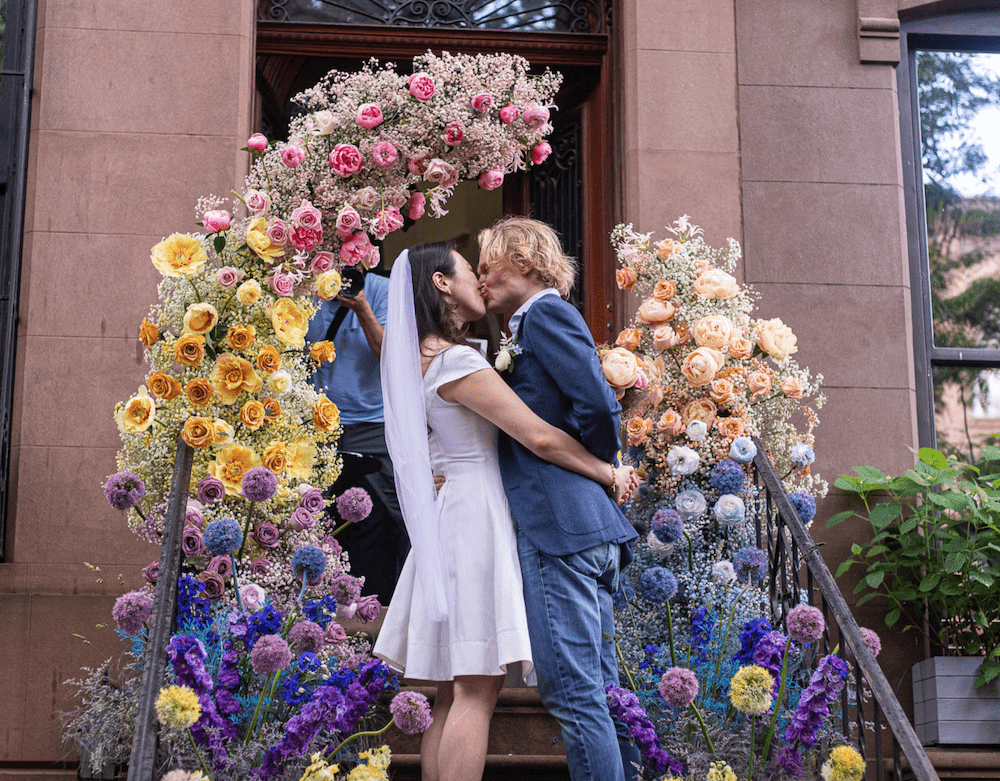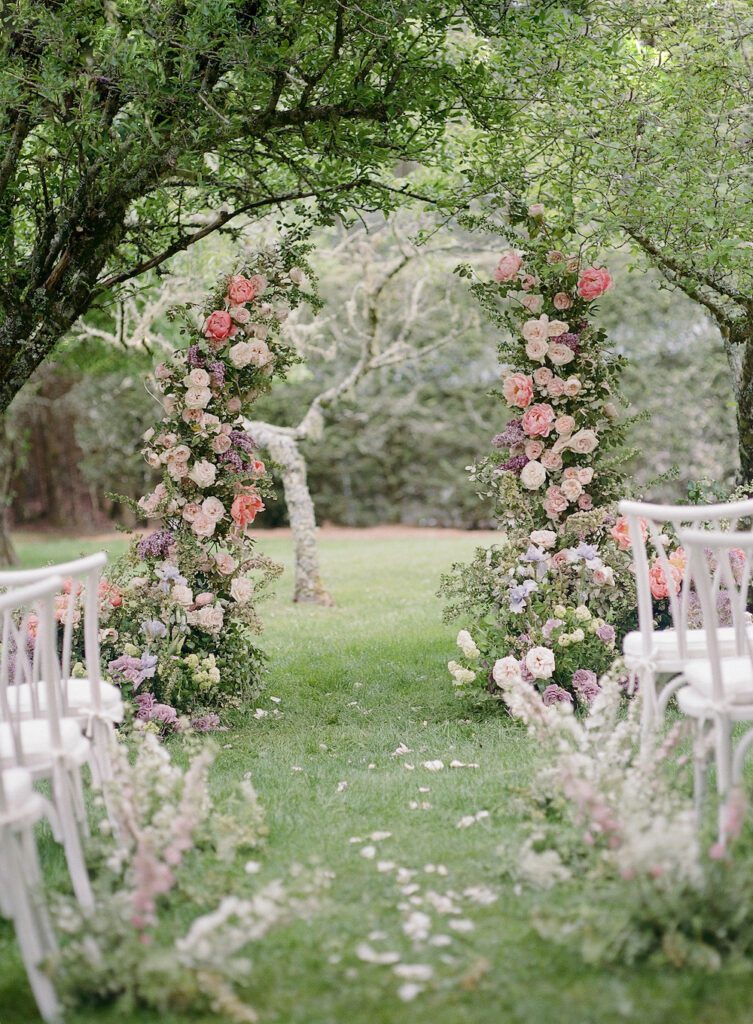Florists Furious at James Corden: Flowers Not a Waste of Money
By Jill Brooke

How can it be that James Corden, an Englishman born in the land of devoted gardeners and flower lovers, has dissed the delightful daffodil, the pillowy peony and even the beloved proud rose by declaring on CBS’ “The Late Late Show” that “flowers are a waste of money.”
Discussing recent news stories on how a massive flower shortage due to so many postponed weddings taking place in the fall, coupled with labor shortages, bad weather impacting production and supermarkets wanting to buy up flower farms, Corden wasn’t sympathetic at all. Au contraire.
“Flowers are a waste of money,” he said, also joking about whether it would be worse to not have them at weddings vs. funerals.
Well James Corden, let me tell you why flowers are more than worth it. Hard-working florists numbering over 60,000 small businesses in the U.S. and flower farmers know how much joy they bring.
“It doesn’t have to be a huge investment,” says Theresa Colucci, owner of Meadowscent in Gardiner, New York. “You can buy a few flowers and it also be meaningful. Flowers are helping people relieve stress and celebrate and honor life events. They are worth the price and many of us are small businesses working very hard to make people happy.”
At our rawest moments, those times when words cannot express the depth of emotions, flowers can.
Flowers silently assure us that beauty and solace exist. They are the weapons of choice to disarm violence despite loss or injustice. They add a peaceful voice to anguish; their beauty is a symbol of hope. That’s certainly worth their short life span.
A clarion call triggers human hands from around the world to find them—the reliable carnation, the fragile anemone, the fragrant lily—and bring them to participate in all of life’s milestones and memorable events.
We see it as veterans honor their dead with poppies—the flowers that grew after Napoleon razed Europe, thus becoming a symbol of rebirth.
We see it as strangers connect through flowers, be it at Sandy Hook or the unexpected death of Princess Diana, the civilian and the celebrity. These gestures can unite a town, a nation or the world.
At weddings, the bridal bouquet once used to camouflage the poor hygiene of wedding guests, nonetheless persevered because flowers are not only beautiful but are metaphors for living and reveling at that moment and marking it forever special. Yes, flowers don’t last – but that is the lesson. It’s a carpe diem reminder. Live in the moment.

Furthermore, the floral arches that create such beautiful wedding imagery do live forever in pictures as well as the memories of families and friends.
For future anniversaries, bride and grooms often buy the same wedding flowers to remember and root to that special day when love was so palpably fresh and alive. Flowers also create tender moments that can put the romance back on track when detours happen. Have you never seen the delight of your wife’s face or your mom’s when she receives flowers?
Shakespeare understood the power of a special bloom. In “A Midsummer Night’s Dream,” pansy juice is used by Oberon as a love potion.
On his return from Elba, Napoleon collected violets from Josephine’s garden, keeping them in a locket until his death on St. Helena. The flower always reminded him of her.
Cleopatra filled her pillows with rose petals and strew them on the ground before Mark Antony to keep him aroused and committed. This is a woman who successfully seduced Caesar too. She even tried to poison someone with a flower petal in a glass of wine.
As humans, we’ve been seeking comfort from flowers for thousands of years.
We know this because in 1951, Dr. Ralph Solecki discovered burial sites in Northern Iraq that had flower fragments from multiple types of wildflowers from 62,000 B.C..
This finding proved the Neanderthal culture wasn’t as barbaric as once thought.
And all it took to uproot centuries of misconceptions was a flower.
Just pause and think about that fact for a moment. Someone 62,000 years ago was climbing hills and roaming fields to collect flowers to pay their respects at a funeral.
And here in 2021, people are placing flowers from flower shops and kiosks for the same reason.
Other people are searching for that iconic David Austin Juliet rose to be part of their big day for its beauty and the memory it will provide.
And costs? Cleopatra loved the lotus flower. She would take a lotus bath every day and would also use the perfume of the lotus blossom to scent the sails of her royal ship. In fact, researchers calculated that her use of floral fragrances to perfume her body would cost the equivalent of $800 a day.
People are wanting the flowers – and are willing to pay for them. No one James Corden is saying that the demand has diminished. It’s only gotten more popular.
“With the isolation and separation brought on by COVID, people turned to flowers in a big way – to say “wish we were there,” “congratulations,” “thinking of you” and so many other reasons. – not to mention a more intense focus on beautifying our homes, where we’ve spent so much time, with flowers and plants,” says Elizabeth Daly of the Society of American Florists. “Over the course of the pandemic, people have fully embraced flowers and found a new appreciation for what they represent.”
It could be because the life-affirming loveliness and bright diverse colors of flowers are a contrast to the somber occasions and locations of loss and personify hope, possibility and rebirth.
Built into a flower’s biological structure seems to be the magical ability to express feelings of grief and gladness, sympathy and joy, hope and courage and of course pure delight.
What’s also fascinating is that comfort and joy happen between the giver and the receiver.
Dr. Loretta Graziano Breuning, a professor emerita of management at California State University and the author of “Habits of a Happy Brain,” says that flowers stimulate social trust in group dynamics in many ways.
“They communicate the intention to invest effort in a relationship,” she says. “They also convey a respect for fragility. We feel the impermanence of flowers, and it reminds us that care is necessary to sustain life.”
And that flowers be it for funerals or weddings, are ways to mark a special time and worth the financial cost for all those emotional riches. Because as history teaches us, even when flowers are stepped or rained on, they grow, trusting their inner beauty and resilience.

Jill Brooke is a former CNN correspondent, Post columnist and editor-in-chief of Avenue and Travel Savvy magazine. She is an author and the editorial director of FPD and floral editor for aspire design and home magazine
Image: Pic and Petal
